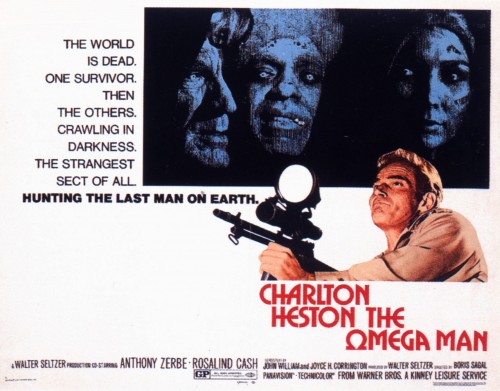 Joseph Laycock, an up and coming scholar of religion and popular culture, has an article in the International Journal for the Study of New Religions Volume 1, No. 2 (2010), titled “Conversion by Infection: The Sociophobic of Cults in the Omega Man.” The abstract:
Joseph Laycock, an up and coming scholar of religion and popular culture, has an article in the International Journal for the Study of New Religions Volume 1, No. 2 (2010), titled “Conversion by Infection: The Sociophobic of Cults in the Omega Man.” The abstract:
The Omega Man (1971), starring Charlton Heston, is a film adaptation of the book I Am Legend by Richard Matheson. Matheson’s novel tells the tale of Robert Neville, the last man left alive after germ warfare has infected humanity with vampirism. The Omega Man differs from the original novel and its other adaptations in several ways: the most notable is that it imbues Heston’s character with obvious Christ-like symbolism. A more significant change went largely unnoticed: instead of vampires, those infected with the plague become part of a militant group called “The Family.” Although The Family is never overtly described as a religion, the antagonists speak to a popular fear of new religious movements that emerged in the 1960s. By pitting a medicalized Christ against a disease-like religion, The Omega Man helped to engender a dual perspective of deviant religion as simultaneously medical and heretical. This dual perspective would shape the discourse of the “cult wars” in the United States for decades, from the abductions carried out by cult “deprogrammers” to the siege of the Branch Davidian compound in Waco, Texas.
This article is worthwhile for those interested in the study of new religions, related issues like Satanic panics, and religion in popular culture in areas such as horror and science fiction cinema. The article can be downloaded in PDF here.





I must admit I enjoyed The Omega Man, in spite of the underlying reactionary aspects (the typically all-American Heston defends himself against a creepy, threatening religious minority with long hair). It’s not on the level of Heston’s other science fiction films (Planet of the Apes, Soylent Green)–a curiosity, rather than a classic. It’s satisfyingly creeply, and has an enjoyably campy feel–one of those movies with “early 1970s” written all over it.